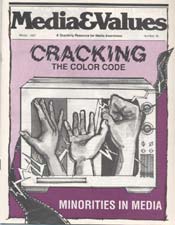FAMILY: Learning to Live In Interracial World
|
This article originally appeared in Issue# 38
|
"What do you think Bryan feels like? What would Bryan like to do?" Marshall's mother asks those questions often. She wants Marshall to imagine himself in his friend Bryan's place. And Marshall must use his imagination as well as what he knows, because he is white and Bryan is black.
Marshall's mother has turned to children's books to help her and Marshall. There are a number of children's books by minority authors available in their public library. They read a lot and they talk about whether Bryan is like or different from the child in the story. "I'm still concerned that we think of persons of color as individuals," she says.
Unlike Marshall, my children grew up in the days when television was mostly black and white — and white was the color of the faces on the screen as well as the color of authority, the contestants in the Miss America pageant and the color of the students in college dorms. There's been some change, but not enough.
Families must still consciously work at filling in gaps that our media eave. Note the bias apparent in news reporting and in who is pictured. Look for minorities shown in responsible positions. Critique what is being inferred by the casting as well as the story.
I'm in favor of using whatever influence is available to us to let newspapers, radio and television in our communities know that we want fair opportunity — and fair portrayals — for minority persons. However, I think the most long-lasting influence comes from our children's interracial friendships. One family I know deliberately moved to an interracial neighborhood to provide their children with multiracial and multicultural relationships.
Our world is interracial. In a recent Ms. interview Winnie Mandela said, "Each and every black mother - whether she likes it or not — is part and parcel of the struggle by virtue of the black blood that runs through her veins." We could say the same thing about the child born Native American, Latino or white. Even family today is a part of the struggle toward living with justice in the world we all share.



